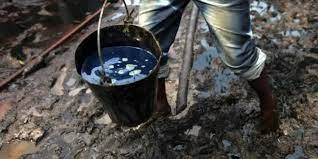The Nigeria Extractive Industries Transparency Initiative, or NEITI, has once again exposed the corruption in the country’s oil and gas business.
Nigeria is Africa’s leading oil producer, with the ability to produce 1.249 million barrels of oil per day. In a comparison chart, it outperforms Libya and Angola.
Unfortunately, no other country in the oil ecosystem has ever lost as much crude to avoidable criminal tendencies as Nigeria, owing to either carelessness or a lack of political will to change the narrative. It assumes that the country’s inability to feed its 200 million starving people is due to the loss of millions of barrels of oil due to leaks and pipeline vandalism, among other things.
In addition, these trends are consciously helped and abetted by the same international oil firms, IOCs, who explore and exploit the oil with the use of government proxies such as security agents and their oil space representatives.
It is even more ironic that, despite having the largest gas reserve in Africa and the ninth largest in the world, Nigeria lacks a solid road network, efficient hospitals, excellent education, and job development for its inhabitants.
Dr. Orji Ogbonnaya Orji, Executive Secretary of NEITI, responded to the above sad story by painting a bleak image of the country’s oil and gas infrastructure and proposing a comparable solution to the country’s extractive industry.
In a keynote address titled “pipeline security, oil theft, and the implications for economic growth” delivered last week at the Nigeria International Pipeline and Security Conference in Abuja, he stated that NEITI’s exposure to information and data that speak clearly to the facts that strengthening security around oil and gas pipelines is critical to the ongoing search for solutions to crude oil theft.
As a result, oil theft and losses in Nigeria have become a national emergency, posing a serious threat to oil exploration and exploitation, with significant negative effects for economic growth, business prospects, and oil company profit earnings.
According to Orji, the sector accounted for 72.26% of Nigeria’s total export and government foreign exchange, 40.55% of government revenue, and supported 19,171 jobs, according to the NEITI’s 2021 Oil and Gas Industry report released in September.
This figure is a far cry given the population of 200 million people and the thousands of new graduates produced each year by institutions across the states.
As a member of the Special Investigative Panel on Oil Theft and Losses, NEITI stated that it was able to determine that oil theft is primarily committed through pipeline clamping, Illegal Connections (ICs) on major pipelines, exploitation of abandoned oil wellheads, pipeline breakages, and vandalism of key national assets, as well as illegally siphoning crude into waiting vessels stationed at strategic terminals.
“This criminal exploits take place most times in atmosphere of communities’ complicity and conspiracy of silence” , Orji added in a statement. This attitude, however, caused Engineer Joseph Ambakaderimo, Executive Chairman Board of Trustees of Community Development Committees, CDC, of Niger Delta Oil and Gas Producing Areas, to seek an urgent partnership with NEITI to conduct out awareness campaign in the oil-bearing areas.
As a co-organizer of the recently concluded Nigerian International Pipelines Technology and Security conference, CDC stated that collaborating with NEITI to carry out advocacy involving oil producing communities in a town hall format for the purposes of enlightenment on the dangers of environmental impact and the effect of oil theft on the economic wellbeing of the country and its citizens would go a long way toward salvaging the country.
It is a sad story that, despite NEITI’s strategic contributions, the country has yet to reap the full benefits of its oil and gas resources due to oil theft and losses caused by pipeline vandalism, pipeline integrity compromise, open sabotage, and general sabotage.
The Niger Delta region is insecure.
It is particularly discouraging that, despite rising oil theft, the Nigerian government has never prosecuted anyone involved in the grave crime of undermining the country’s economy. It goes after individual urchins, leaving behind their supervisors in the Army, Navy, Civil Defense, and powerful politicians, among others.
According to NEITI data, oil theft and losses in Nigeria between 2009 and 2020 totaled 619.7 million barrels of crude, valued at S$46.16 billion (N16.25 trillion). This explains why Nigeria is increasingly reliant on external borrowing to support its economy and provide for its inhabitants.
Furthermore, from 2009 to 2018, Nigeria lost 4.2 billion litres of petroleum products from refineries, valued at US$1.84 billion at a rate of 100,000 barrels per day.
“The total value of crude losses between 2009 and 2020 is higher than the size of the country’s foreign reserves and almost ten times Nigeria’s oil savings in Excess Crude Account” , the paper goes on to say.
According to NEITI, between 2017 and 2021, Nigeria documented 7,143 incidences of pipeline breakage and deliberate vandalism, leading in crude theft and product losses totaling 208.639 million barrels valued at $12.74 million or N4.325 trillion. According to the estimates, Nigeria spent N471. 493 billion on pipeline repair and maintenance during the same time period.
This assumes that the economy cannot grow in an environment characterized by oil theft, pipeline vandalism, and general instability in oil-producing towns.
To salvage this tragic position, NEITI advised, among other things, reconstruction of the Presidential Steering Committee on Petrol Industry Act Implementation with Industry Experts and key relevant agencies as members, combating oil theft, crude losses, and pipeline vandalism.
It also advocated for the development of a Gas Utilization Policy with links to Nigeria’s Energy Transition Plan, as well as the expediting of repairs to government-owned refineries with necessary steps to safeguard pipelines and business environments for easy access, product delivery, and evacuation.
The extractive industry has urged for Nigeria’s membership in the worldwide EITI and NEITI to be strengthened in order to provide knowledge, impartial information, and statistics to help the reforms.
Apart from its massive crude oil reserves, Nigeria is a prominent player in the global gas industry, not only in Africa. It is regrettable that, despite its abundant oil and gas reserves, Nigeria remains at the bottom of the economic scale.
The country is unable to feed its people while relying heavily on cap-in-hand borrowing to prop up a mismatched economy deliberately depleted by affluent individuals in charge. The CDC’s Board Chairman, Joseph Ambakaderimo, noted that community involvement in oil theft is the result of years of abandonment by government organizations such as the NDDC, Ministry of Niger Delta Development, and others.
“There have been mismanaged resources that would have previously been deployed to the development of these communities.”
As a result, we must hold all of these entities accountable for the resources that have accrued to them and hold them accountable for oil theft in the region,” he advised. “In addition, the CDC is calling on government to also collaborate with it and provide all necessary support to the CDC to enable our members take control of the security of the oil and gas pipelines crisscrossing our communities rather than this humongous expenditure to other entities that has not provided any success” .
He stated that the CDC is well-positioned in every community that produces oil and gas in the Niger Delta region, with a mandate to develop and secure their communities.
“If the worrying trend of oil theft is not stopped, the government will find it difficult to provide basic amenities that will improve people’s living standards.” Communities must be made aware that they cannot be a part of a system that prevents them from developing their places. As a result, we must embark on this advocacy path with the CDC leading the way.”
Ambakaderimo revealed that the same collaboration is already underway with the chairman of the House Committee on Upstream and the special House Committee on Oil Theft and Security, Honourable Alhassan Doguwa, who attended the conference on behalf of the Honourable Speaker of the Federal House of Representatives, Rt. Honourable Tajudeen Abbas.



